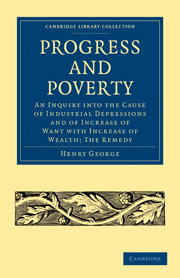 Progress and Poverty
Progress and Poverty Published online by Cambridge University Press: 07 September 2011
The conclusions we have reached as to the laws which govern the distribution of wealth recast a large and most important part of the science of political economy, as at present taught, overthrowing some of its most highly elaborated theories and shedding a new light on some of its most important problems. Yet, in doing this, no disputable ground has been occupied; not a single fundamental principle advanced that is not already recognized.
The law of interest and the law of wages which we have substituted for those now taught are necessary deductions from the great law which alone makes any science of political economy possible—the all-compelling law that is as inseparable from the human mind as attraction is inseparable from matter, and without which it would be impossible to previse or calculate upon any human action, the most trivial or the most important. This fundamental law, that men seek to gratify their desires with the least exertion, becomes, when viewed in its relation to one of the factors of production, the law of rent; in relation to another, the law of interest; and in relation to a third, the law of wages. And in accepting the law of rent, which, since the time of Ricardo, has been accepted by every economist of standing, and which, like a geometrical axiom, has but to be understood to compel assent, the law of interest and law of wages, as I have stated them, are inferentially accepted, as its necessary sequences.
To save this book to your Kindle, first ensure [email protected] is added to your Approved Personal Document E-mail List under your Personal Document Settings on the Manage Your Content and Devices page of your Amazon account. Then enter the ‘name’ part of your Kindle email address below. Find out more about saving to your Kindle.
Note you can select to save to either the @free.kindle.com or @kindle.com variations. ‘@free.kindle.com’ emails are free but can only be saved to your device when it is connected to wi-fi. ‘@kindle.com’ emails can be delivered even when you are not connected to wi-fi, but note that service fees apply.
Find out more about the Kindle Personal Document Service.
To save content items to your account, please confirm that you agree to abide by our usage policies. If this is the first time you use this feature, you will be asked to authorise Cambridge Core to connect with your account. Find out more about saving content to Dropbox.
To save content items to your account, please confirm that you agree to abide by our usage policies. If this is the first time you use this feature, you will be asked to authorise Cambridge Core to connect with your account. Find out more about saving content to Google Drive.